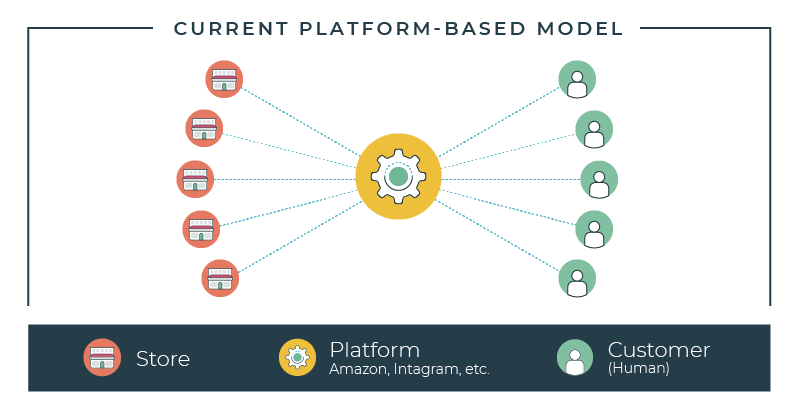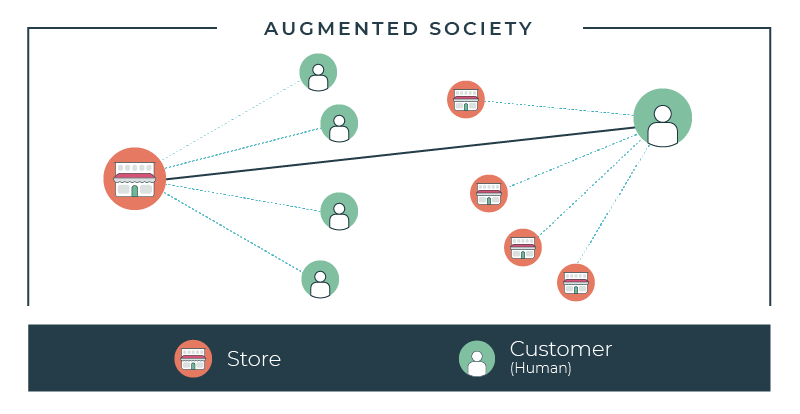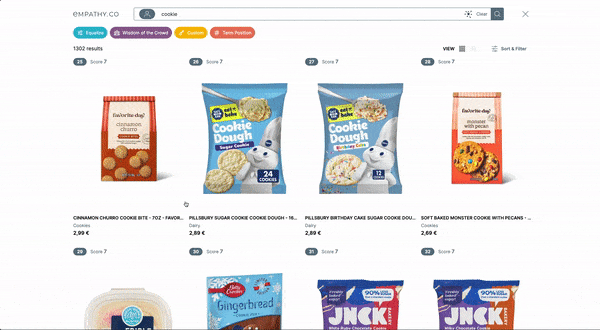How we build the Augmented Society
How we build the Augmented Society
Creating true value within our local communities
We, as consumers, have lost direct connections with brands because most communication happens on social media and online marketplaces (like Amazon). In essence, the shopping experience is reduced to a vending machine.
Additionally, in the race for efficiency in shopping experiences, we traded one type of convenience for another. The proximity to shops, food and culture that once made cities attractive has been overshadowed by the demand for instant service on apps.
Now that we understand the negative impact that platforms like social media and online marketplaces have on our physical and online worlds, it’s time to explore alternatives…
Augmented Society Series, Part 3
The power of the Internet is that people around the world can connect and interact with each other. It takes your location out of the equation. So naturally, businesses started to look for ways to connect with the whole world. Fast forward to today, a handful of platforms dominate the digital world.
But as much of our lives got intertwined with the Internet, it became apparent there is also value in augmenting, or growing, the relationships between our close surroundings and the people and businesses we interact with in our local communities.
In their quest to conquer the world, the Big Data companies of today formed a blind spot for this value. And if 2022 taught us anything, it’s that Big Tech is struggling. From massive layoffs to failing business strategies, there’s an urgent need for different models.
Enter the Augmented Society. With this alternative model, the answer lies in taking our environment as the goal of technology, not a means to an end. The communities that people created have intrinsic value; the proximity to each other, facilities like libraries, museums, and of course, commerce.
Instead of capturing this value on a platform, technology can be used to augment it in a way that the ones providing the value, both local shops and the everyday person, will benefit the most.
Big Tech is often about quantity, but missing quality. Every business tries to be McDonald’s, but wouldn’t you prefer the quality of your local burger joint? Not to say there’s not a place for big chains in today’s market, but the need for local connections lives on.
So while platforms struggle to create value in the physical world, there’s an opportunity to look at other solutions that bring your store/brand the attention of local customers. For this, there’s no need to use global platforms that reduce both the shop and the consumer to a commodity. Focusing on customers close to you can be a strategic opportunity, that gives you a competitive edge over your worldwide competitors, including the platforms.
I’m not talking about targeted marketing, where you can select a target group in a specific area. No, there’s much more that can be done when you really connect with your customers. But we need to let go of the platform idea, where two sides are brought together and then matched on preferences (or more realistically, boosting the brand who pays the most to feature their products).

What all platforms have in common is that they control both the connection and all the data that these connections generate. But in the Augmented Society, only the connection between shop and the customer needs to be established. The ones creating the data by interacting with each other, stay in full control.
What is needed to create an Augmented Society?
Facilitate the relationship, don’t own it
If we take out the platform, both stores and customers need to be able to save and share their own data. For most stores, this shouldn’t be a problem; most hosting providers offer database services as part of their services. Customers, on the other hand, do not have any tools to manage their data.
In recent years, the development of personal online data storage (Pods) has taken off and is now being steadily adopted. The world’s largest broadcaster, the BBC, is among the pioneers experimenting and testing this new decentralised data storage method. Their recently launched project is based on Pods, and with others following suit, the way to adaptation is being paved.
So there is storage on the one hand, but the connecting vendor and customer side is a different story. Bringing buyers and sellers together in the vast and cluttered supply of the world wide web has been the key selling point for platforms.
As outlined above, in the Augmented Society model, the focus is on local communities: the proximity between buyer and seller is what makes the connection efficient, taking away this key selling point.

Value remains in and for the community
Have you ever tried to search for a restaurant, only to find yourself sifting through the top hits from Uber Eats, TheFork and others apps to find the actual restaurant somewhere at the bottom?
Has this left you with some disappointment or frustration that you were unable to find the information you were looking for? This is just another example of platforms taking over the experience from local campanies, further reducing them to commodities.
In the Augmented Society, stores and customers can be in control. Stores choose what services they need, to offer value to their customers. Not only does this enable stores to create unique and more personal experiences, it allows shops to compete on values rather than price alone.
Envisioning the Augmented Society
As this model is based on existing relationships (between people and their environment), a key requirement is to make these relationships visible. For consumers, it could all start with a simple map that a person fills with all the locations they like in the place they live. From their favourite bars to shops, or even that perfect bench in the sunshine for reading. Unlike pinning locations (like in Google Maps), data is under the full control of the person. No platform is in the middle.
A map like this is also very personal, because it tells a lot about someone’s preferences and intentions. Once you have created your own personal collection, you can allow the places you have marked to communicate with you: Your favourite bar can send you updates, and shops can easily share their new collection. Your local government can inform the community about city cleaning or activities in your favourite park.
Depending on the relationship with the place, you can decide how much information you’d like to share. You’re in control of the experience, from subscribing to updates without giving any information, to sharing preferences and interests to receive more personalised information.
Shops win in this scenario too. They can connect with you according to the level of personalisation you have established. For example, they can offer local reward schemes without ever needing to store your personal data.
This vision of the Augmented Society might not sound revolutionary, but it is. To some extent, the groundwork is already live on today’s platforms. Google Maps for your favourite places, Instagram for the updates.
The difference is that you are in control. You build your own augmented society.
The kinds of locations you connect with will require different kinds of communications. And since it is not controlled by a single platform, stores have the power to choose the appropriate tools themselves. For example, your local clothing store could offer same-day deliveries via local carrier at more competitive prices for you.
Unlike platforms, the Augmented Society rewards building strong long-lasting relationships over short-term growth. Both individuals and shops have to invest, as with any meaningful relationship. Ultimately, with more privacy and a more personal experience, the return of this investment is much greater than any platform could deliver.










